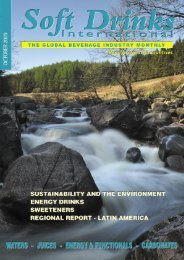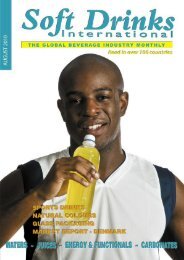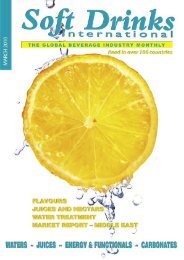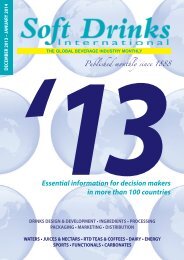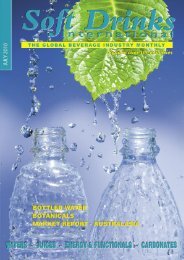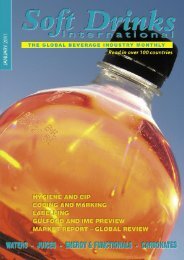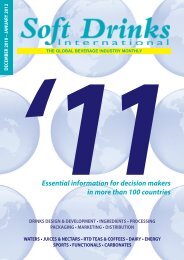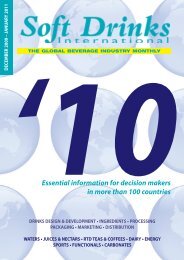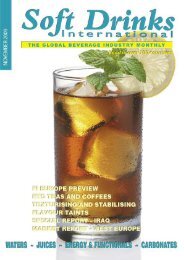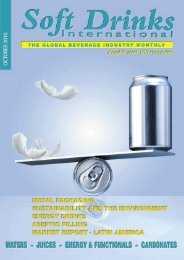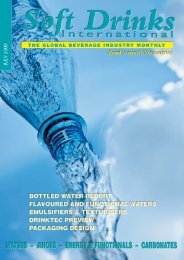Palatinose - Soft Drinks International
Palatinose - Soft Drinks International
Palatinose - Soft Drinks International
Create successful ePaper yourself
Turn your PDF publications into a flip-book with our unique Google optimized e-Paper software.
20 INGREDIENTS<br />
<strong>Soft</strong> <strong>Drinks</strong> <strong>International</strong> – February 2011<br />
Whey protein gets<br />
sporting approval<br />
VOLAC has welcomed the latest <strong>International</strong><br />
Olympic Committee’s (IOC) Consensus<br />
Statement on Sports Nutrition which<br />
recommends that athletes consume high<br />
quality proteins, soon after exercise and at<br />
optimal amounts throughout the day, as a<br />
way of maximising the long term gain and<br />
repair of muscle.<br />
Suzane Leser, Nutrition Manager of<br />
Lifestyle Ingredients, Volac, and Vice-Chair of<br />
the European Specialist Sports Nutrition<br />
Alliance (ESSNA), said this advice represents<br />
good news for the whey protein<br />
industry, following, as it does, the limited<br />
endorsement of protein quality by the<br />
European Food Safety Authority (EFSA)<br />
under article 13.1 rulings on protein and<br />
whey protein.<br />
She said: “The importance of consuming<br />
high quality protein at strategic points in<br />
the day has emerged since the last IOC<br />
Consensus Statement in 2003, and is now<br />
being recognised as key to athletic performance,<br />
alongside hydration and energy.<br />
“The new Consensus will form the basis<br />
for nutritional guidance to athletes in the<br />
run up to London 2012 and this is great<br />
news for the whey protein industry, particularly<br />
as the IOC experts go further than<br />
EFSA in recognising that not all proteins are<br />
equal, and recommending that athletes consume<br />
those of high quality. This would<br />
include whey protein as it has one of the<br />
highest biological values.”<br />
The IOC statement advises that “Foods<br />
or snacks that contain high-quality proteins<br />
should be consumed regularly throughout<br />
Sweet sports<br />
recovery<br />
ADM Cocoa is promoting the use of cocoa<br />
powder in dairy-based chocolate flavour<br />
beverages, which can be consumed as an<br />
alternative to sugar-rich commercial sports<br />
recovery drinks. The company maintains<br />
that with the market for sports drinks in<br />
Western Europe expected to grow at a<br />
CAGR of 4% by 2014, the opportunity to<br />
position dairy-based beverages as beneficial<br />
to sports recovery can help set manufacturers<br />
apart. ADM's own deZaan D21MC<br />
cocoa powder is claimed to provide a<br />
unique flavour and stability in long shelf life<br />
dairy-based recovery drinks.<br />
Chocolate milk has proven to be an<br />
excellent recovery aid after prolonged<br />
physical activity as it helps to replenish the<br />
nutrients that exercisers lose during a long<br />
workout. It also offers the added health<br />
benefits of calcium. The higher carbohydrate<br />
content of chocolate milk compared to<br />
standard milk is thought to contribute to its<br />
Volac's whey protein isolate Volactive Hydrapro.<br />
the day as part of the day’s total protein<br />
intake”. The IOC also recommends that<br />
athletes “take 15-25 g of such protein after<br />
each training session to maximise the synthesis<br />
of proteins.”<br />
Mark Neville, Head of Lifestyle Ingredients,<br />
Volac, observes that it is not only the<br />
demanding training regimes of potential<br />
Olympians that will drive the sports nutrition<br />
market. “Consumers, trying to combine<br />
a physical fitness regime with a hectic<br />
lifestyle also place a high value on convenience.<br />
Our research, conducted among<br />
consumers committed to undertaking sport<br />
or exercise, showed that there is a potential<br />
mainstream market for a sports recovery<br />
drink containing whey protein.”<br />
Until recently, the addition of whey protein<br />
to clear beverages has not been without<br />
its technological challenges. However,<br />
Volac has overcome these difficulties with<br />
the development of Volactive Hydrapro –<br />
an enhanced, fat-free whey protein isolate<br />
performance. Further high quality cocoa<br />
powder can effectively mask the bitter taste<br />
of some protein-rich sports recovery beverages.<br />
A key functional advantage of deZaan<br />
D21MC in dairy beverages is that it inhibits<br />
protein agglomeration and provides excellent<br />
stability against sedimentation, resulting<br />
in a smooth mouthfeel.<br />
Steve Laning, Innovation Director at<br />
ADM Cocoa, commented, “Chocolate milk<br />
or chocolate flavour dairy-based sports<br />
recovery drinks are a more palatable, convenient<br />
and cost-effective option than existing<br />
alternatives on the market.”.<br />
which combines high solubility with heat<br />
stability, a long shelf life and neutral taste.<br />
Mark Neville concludes: “The IOC advice<br />
combined with the potential mainstream<br />
market revealed by the Volac research<br />
makes powerful reading for sports drinks<br />
manufacturers. Against this backdrop, and<br />
with the manufacturing challenges overcome,<br />
now is the time for drinks manufacturers<br />
to bring innovation to the sports<br />
recovery market by combining the benefits<br />
of this high quality whey protein with carbohydrates<br />
and fluids in a clear, convenient<br />
and refreshing beverage.”<br />
EFSA rules on oats<br />
A SCIENTIFIC panel of the European Food<br />
Safety Authority (EFSA) has published a<br />
positive opinion on a disease risk reduction<br />
health claim dossier for oat beta-glucan following<br />
an application from CreaNutrition<br />
AG submitted pursuant to Article 14 of the<br />
EC regulation on nutrition and health<br />
claims.<br />
According to the positive opinion of the<br />
EFSA panel for dietetic products, nutrition<br />
and allergies (NDA), foods providing 3g of<br />
oat beta-glucan per day can bear the health<br />
claim: “Oat beta-glucan has been shown to<br />
lower/reduce blood cholesterol. Blood cholesterol<br />
lowering may reduce the risk of<br />
heart disease.” The health claim still needs<br />
to be approved by the EU Commission.<br />
Bioactive oat beta-glucan is the cholesterol-lowering<br />
constituent of CreaNutrition’s<br />
OatWell oat bran ingredients.<br />
In brief…<br />
● The Best Innovative Stevia Product 2010<br />
award went to Naturex, the French company<br />
based in Avignon, at the recent Malta<br />
Stevia 2010 conference organised by<br />
ISANH (<strong>International</strong> Society of Antioxidants<br />
in Nutrition and Health). Talin (Thaumatin),<br />
a low-calorie flavour modifier, a<br />
natural protein, is physically extracted from<br />
the katemfe fruit, Thaumatococcus daniellii,<br />
from the West African rainforests.<br />
● The Food Additives and Ingredients<br />
Association has updated and relaunched its<br />
website to present the latest facts and<br />
information about food additives and ingredients<br />
in a clear and easy to read style. The<br />
site – www.faia.org.uk – provides the definitive<br />
source of information about E-numbers<br />
(food additives) and functional<br />
ingredients. It features a useful glossary, an<br />
extensive list of Frequently Asked Questions<br />
and useful web links.



